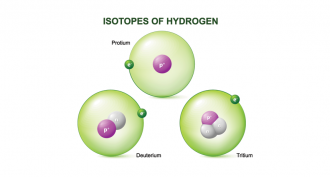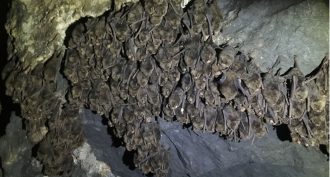Scientists Say
A weekly word defined, in a sentence and in context. Click here to find the alphabetized list.
-
 Chemistry
ChemistryScientists Say: Isotope
An isotope is a variety of an element that has the same number of protons but a different number of neutrons — or neutrally charged particles.
-
 Planets
PlanetsScientists Say: Eclipse
How the sun, moon and Earth line up determines whether there’s a solar or lunar eclipse.
-
 Chemistry
ChemistryScientists Say: Atomic number
How do you know where an element sits in the periodic table? Count its protons to get its atomic number.
-
 Plants
PlantsScientists Say: Guttation
When water vapor can’t escape a plant, it might force its way out through a process called guttation.
-
 Plants
PlantsScientists Say: Stomata
Plants have pores they open and close to let oxygen, carbon dioxide and water vapor in and out. These pores are called stomata.
-
 Brain
BrainScientists Say: Synapse
When brain cells need to pass messages, they do it without touching, across a space called a synapse.
-
 Planets
PlanetsScientists Say: Dwarf planet
Dwarf planets are distinct from the full-size models. A little too small, they also have a lot of space stuff filling their path around the sun.
-
 Life
LifeScientists Say: ATP
This chemical is a bit like a rechargeable battery. Cells build and break apart its chemical bonds to store and release energy.
-
 Planets
PlanetsScientists Say: Goldilocks zone
Not too hot, not too cold. Just right. This is the region around a star where water could be a liquid, instead of a solid or gas.
-
 Physics
PhysicsScientists Say: Dark matter
Most of the universe isn’t made of stuff we can see. Scientists think some of it might be made of dark matter — matter that emits no radiation.
-
 Animals
AnimalsScientists Say: Hibernation
Hibernation is more than a deep sleep. Animals that hibernate lower their body temperature and reduce their body activities for months.
-
 Health & Medicine
Health & MedicineScientists Say: Hyperthermia
If our body temperatures rise too high, we can suffer from hyperthermia.